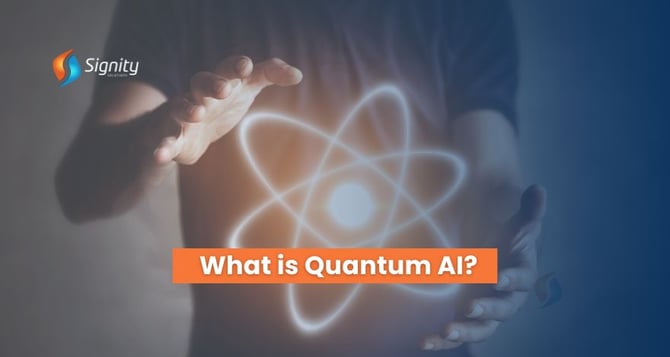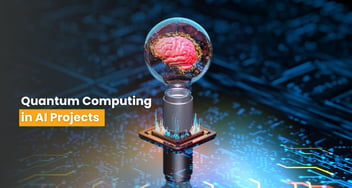What is Quantum AI?
Explore the fusion of Quantum Computing and Artificial Intelligence in our blog, their comparative aspects, impact on critical fields like Medicine, Finance, and Climate Science, and future applications. Discover possibilities like enhanced machine learning algorithms, complex data processing, and optimized neural networks.

In the realm of cutting-edge technology, where the boundaries between science fiction and reality blur, Quantum Artificial Intelligence (QAI) emerges as a beacon of innovation.
It's a field that melds the transformative potential of quantum computing with the ingenuity of artificial intelligence (AI) to pave the way for groundbreaking advancements in machine learning algorithms, neural networks, and large language models (LLMs).
Comparing Quantum and Classical Computing
Explore how quantum computing harnesses the principles of quantum mechanics to revolutionize processing power and information storage, contrasting with the sequential logic of classical computing.
Understand the scalability, applicability, and current usage of each, highlighting their distinct advantages and limitations in various fields.
Quantum Computing:
-
Usage: Primarily used in specialized, high-speed, and experimental quantum hardware.
-
Information Storage: Employs qubits with states including 0, 1, or a superposition of both.
-
Processing Method: Utilizes quantum logic for parallel processing, leading to faster computations for specific tasks.
Classical Computing:
-
Usage: Commonly used in everyday devices and multi-purpose computers.
-
Information Storage: Utilizes bits with discrete states of 0 or 1.
-
Processing Method: Processes data logically and sequentially.
Comparative Points:
-
Scalability: Classical computing is scalable and applicable across various devices, while quantum computing is more specialized and experimental.
-
Applicability: While quantum computers excel at specific tasks like prime factoring, they're not universally superior to classical systems for everyday tasks.
-
Hybrid Systems: Increasingly, cloud-connected quantum computers and hybrid ecosystems combine classical and quantum systems for advanced applications.
-
Current Usage: Classical computing continues to dominate everyday operations, but quantum systems are making headway in fields like cryptography, drug discovery, and financial modeling.
-
Future Prospects: Quantum computing holds promise for solving complex problems at a scale not feasible with classical methods, but its full potential is yet to be realized in practical applications.
How Quantum AI Works
Quantum AI combines the power of quantum computing with traditional AI techniques. While the specifics are complex, here's a simplified breakdown:
Quantum Data Prep
Quantum data, unique to quantum computers, is converted into a format compatible with AI algorithms. Imagine it like translating a foreign language into something a computer can understand.
Quantum Processing
Specialized quantum neural networks analyze the data, aiming to extract valuable information hidden within its complex structure.
From Quantum to Classical
The results are then converted back into a classical format (like numbers) that traditional AI models can work with.
Classical AI Takes Over
Once in this format, deep learning techniques can identify patterns and relationships within the data. This allows the AI to learn and make predictions.
Continuous Improvement
Throughout this process, the model is constantly refined by adjusting its parameters based on the results. This ensures the AI continues to learn and improve its performance.
The Impact of Quantum AI
The Impact of Quantum AI reveals how Quantum Artificial Intelligence (QAI) is reshaping industries.
Explore how QAI accelerates progress in medicine discovery, data processing, investment strategies, and weather forecasting.
-
Exponential Multiplier: Quantum AI (QAI) has the potential to significantly amplify the benefits of applied AI through increased processing speed, power, and capability.
-
Rapid Expansion of AI: As a new technology, AI's impact on daily life is still unfolding, with rapid expansion across various industries. Goldman Sachs predicts AI could boost global GDP by 7% by 2033.
-
Enhanced Data Processing: Quantum computers excel at processing massive datasets, making them invaluable for tasks requiring large-scale data processing. For instance, QAI could drastically reduce the training time of Language Model Models (LLMs) from weeks to hours, enabling the rapid creation of highly specialized AI assistants for complex subjects.
-
Revolutionizing Critical Fields:
-
Medicine: Quantum AI can expedite drug discovery by better modeling molecular biology, leading to faster development of critical treatments. It can also analyze vast patient data for insights into treatment efficacy and preventive care.
-
Finance: QAI's ability to find patterns and make predictions from complex datasets could revolutionize trading platforms, optimizing investment portfolios for maximum profits. Additionally, quantum's impact on cybersecurity protocols will lead to next-gen cryptographic systems.
-
Climate Science: Quantum computers excel at modeling complex natural processes, enhancing weather prediction and forecasting. Quantum AI can aid in climate science by testing carbon reduction initiatives and developing green technologies.
-
-
Potential Future Applications: Quantum AI holds promise for addressing challenges across diverse fields, from healthcare to finance and climate science. Its ability to process vast amounts of data and uncover insights quickly could lead to significant advancements in various domains.
What Are The Possibilities of Applying Quantum Computing to AI?
-
Enhanced Machine Learning Algorithms: Quantum computing offers the potential to develop more efficient machine learning algorithms by leveraging its parallel processing capabilities. This could lead to faster training times and improved accuracy in AI models.
-
Complex Data Processing: Quantum computing's ability to handle massive datasets and process complex data structures simultaneously opens up new avenues for AI applications. It allows for more intricate analysis of data, leading to deeper insights and better decision-making.
-
Optimized Neural Networks: Quantum computing can optimize the structure and parameters of neural networks, leading to more robust and adaptive AI systems. This could result in AI models that are better equipped to handle real-world scenarios and adapt to changing environments.
-
Exploring Uncharted Territories: Quantum computing enables AI to explore complex problem spaces that are currently beyond the reach of classical computing. This includes tasks such as molecular modeling, drug discovery, and optimization problems, where quantum algorithms can provide significant advantages.
-
Breaking Encryption: Quantum computing has the potential to break existing encryption methods, which could have implications for AI systems that rely on secure data transmission and storage. This could spur the development of new encryption techniques and cybersecurity measures to protect AI systems in a quantum-powered world.
Our Contribution: Quantum AI Development Services
At our company, we are at the forefront of Quantum AI development, offering state-of-the-art solutions tailored to meet our clients' unique needs. As a leading generative AI development company, our team of developers combines expertise in quantum computing and artificial intelligence to deliver innovative Quantum AI solutions.
How We Can Help You?
-
Custom AI Solutions: We specialize in developing custom AI solutions tailored to your specific requirements, whether it's optimizing business processes, accelerating scientific research, or enhancing machine learning models.
-
Expert Consultation: Our team of experienced ChatGPT developers and quantum computing experts provide expert consultation to guide you through the complexities of Quantum AI, helping you leverage this transformative technology effectively.
-
Implementation and Integration: From conceptualization to implementation, we offer end-to-end support in integrating Quantum AI solutions into your existing workflows, ensuring seamless adoption and integration.
Conclusion
As Quantum AI continues to evolve, it holds the promise of unlocking unprecedented capabilities in artificial intelligence and computing.
With our expertise in Quantum AI development and a dedicated team of AI experts, Signity Solutions is your trusted partner in harnessing the power of Quantum AI to drive innovation and achieve your business goals.















